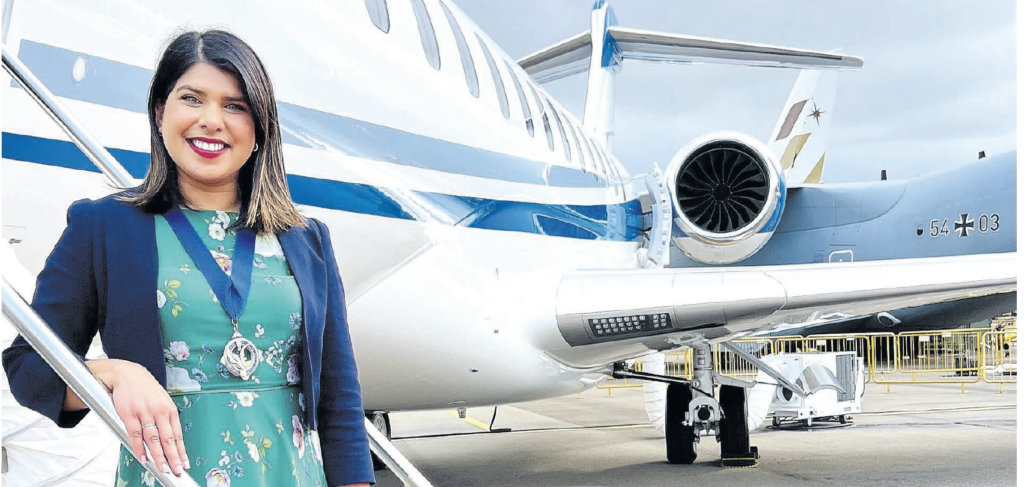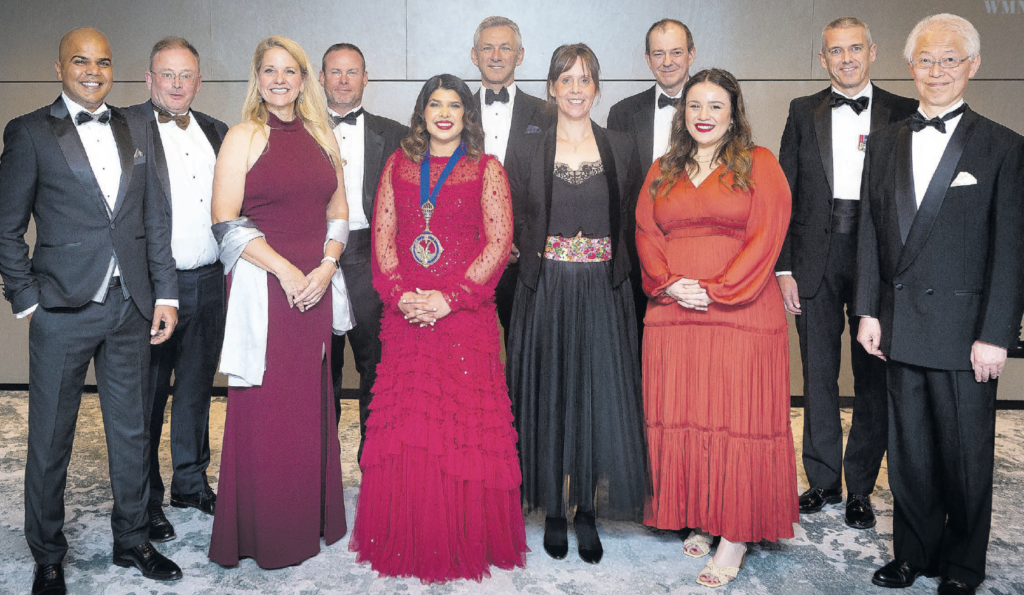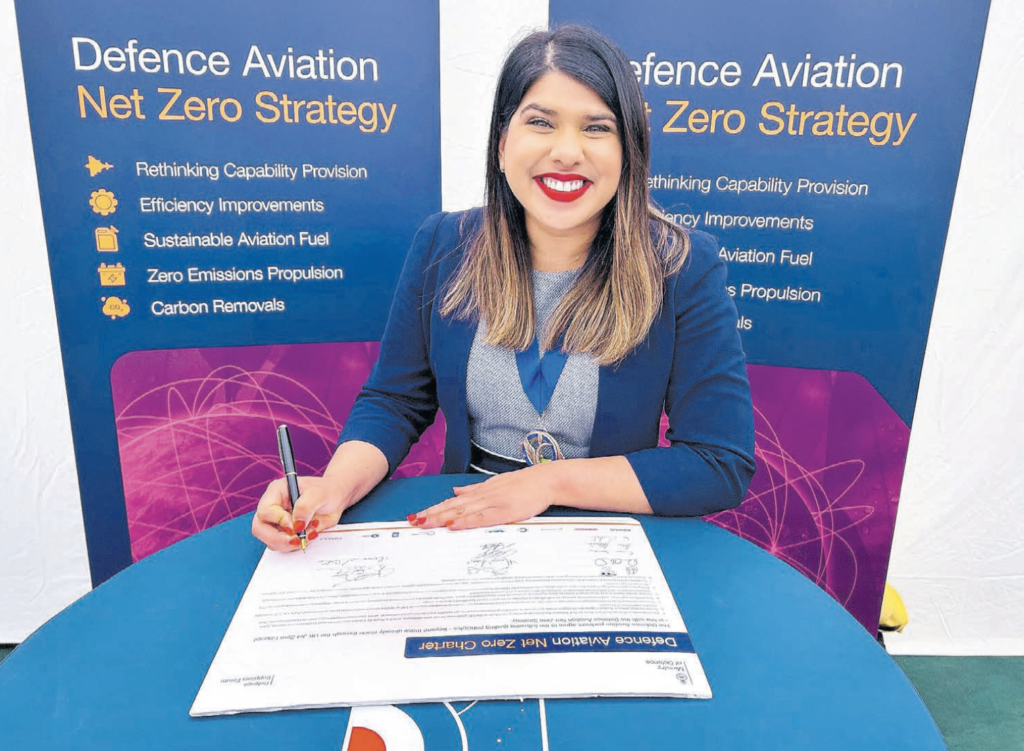Kerissa Khan’s dreams take off: Trini engineer heads Royal Aeronautical Society

IT is a quiet day in the small, southeastern town of Rio Claro in Trinidad. A little girl named Kerissa Khan is playing outdoors, having the time of her life.
But then she spots some white trails across the sky and hears a thunderous sound. Is it a bird? No. Is it a plane? Yes. It is the Concorde, moving faster than the speed of sound, and little Kerissa is fascinated.
But who knew decades later, she would grow up to become one of the world’s leading aeronautical professionals?
Khan is now an aeronautical engineer and the second woman and youngest person ever to become the president of the Royal Aeronautical Society in the UK.
Born and raised in TT, she told WMN she enjoyed growing up in a country with “such a diverse community.
“I loved growing up in Rio Claro and Mayaro.
“We (TT) are, as you know, a melting pot of ethnicities and backgrounds and religions, and you just have a unique opportunity to grow up with such a rich, diverse culture and that embeds into who you are.”
Now, having lived in countries that include Scotland, England, Canada and France, she says those experiences were “just not the same” as home. She currently lives in London.
Growing up, she was an “outdoor kid” who loved basking in good weather and regularly going to the beach.
“It is (an experience) I would never replace.”
It was also during her childhood that she was bombarded with fun facts about aeroplanes by her older brother Shirayd Khan as they watched the Concorde flying above.
Concorde flew commercially from 1976-2003 and was the world’s first supersonic, commercial aeroplane. As soon as Khan started to speak about it in her interview with WMN, her eyes lit up and her voice got high and squeaky. She was very excited to explain how it all began.
“He (my brother) was constantly explaining how they work. He used to say, ‘Do you know that sonic boom what you’re hearing – that aircraft flies faster than the speed of sound?’
“I was like, ‘What? How can it do that?’ and I was so drawn in to this aircraft. I was obsessed, to be honest. I was intrigued by something groundbreaking, and to know there are people who make that possible…I wanted to be one of those people who could make things that seem impossible possible.”
When she attended ASJA Primary School in Princes Town, she loved maths and science. Although she did not reveal her age, the only hint she gave was that she wrote Common Entrance and not the SEA exam.
“I just enjoyed learning new things. I was always curious and fascinated by anything that is really captivating in science.”
And by the time she moved on to Naparima Girls’ High School in San Fernando, she knew what field she wanted to enter.

“I genuinely looked forward to learning about physics and aerodynamics and fluids...I guess it’s like one (interest) drove the other, where I was really interested in math and physics and I also knew those would be helpful for (the) career (I wanted).”
She took a year off after secondary school to go to pilot school in Piarco. But while making up airtime on completing her exams to become officially certified, the time came for her to begin studying aeronautical engineering at the University of Glasgow, Scotland.
“I was learning to fly as a hobby and I had always been fascinated with flight, but (I knew) my degree was really the job I wanted to do, so I said, ‘You need to leave the hobby behind.’”
She did a five-year master’s degree in aeronautical engineering, which also included industry experience.
She recalled the “climate shock” she experienced after moving to Scotland in 2007.
“I arrived in autumn, so it was already freezing!”
But she praised the “supportive, fantastic community” she was surrounded by during her time there. Asked how people would typically react when they learnt where she was from, she said, “I pretty much had to pull a map down and say, ‘Okay, this is the Caribbean, this is Venezuela and this is TT.’
“People are usually surprised and curious and fascinated. And also, they think, ‘Wow! How did you get from there to here?’”
And, obviously ignoring the option of jokingly replying, “On an aeroplane,” she would give them an insight into her journey.
“And then that opens up a whole wider conversation.”
She now boasts of aerospace designing systems – which she calls her babies – for the Bombardier Global 7500/8000, Airbus A320, A321 and A330, Boeing 787, Eurofighter jets like the Typhoon and Tornado, among others.

of Defence Sustainability Charter to commit to advancing sustainability in defence aviation.
She leads the innovation for the Future Flight Challenge at UK Research and Innovation, the national funding agency investing in science and research in the UK. It is sponsored by the government’s Department for Science, Innovation and Technology.
“So anything that is ‘future flight,’ whether it’s designing a new aircraft that is more sustainable and more accessible to people, that has more of a hydrogen base…Anything future, I lead innovation for.”
Every day, she said, millions of people depend on this sector more than they realise.
“From the fact that we can connect and talk to each other, the reason why we can track climate change, track drug traffickers across borders, (the reason) we have food in various parts of the world and I can get my essential medicines…”
She said her job is to ensure the world continues to benefit from the sector. It is very important, she said, to secure the future workforce to allow the industry to move forward.
“You can’t keep digging from the same talent pool to get different results. If you want to drive innovation, you have to have diversity of thought, young people…”
When it comes to her duties as the president of the 158-year-old Royal Aeronautical Society, she leads the team to “further the advancement of aeronautical art, science and engineering around the world,” according to its website. It is the only professional body dedicated to aerospace, aviation and space communities. She was elected in May 2023.
The website says Khan upholds the society’s values, reputation and the interests of its members. She is also an ambassador for the society, “representing it at key engagements, influencing the global standing of the society in furthering the advancement of aeronautical art, science and engineering.”
She recalled when something unexpected happened at her inauguration ceremony.
As usual, she was fangirling over the Concorde during her speech in front of over 500 people. After the ceremony was complete, a man approached her and said, “I was the pilot flying above you. I was the pilot flying the Concorde.” “
And I cried and he cried,” she said, even getting emotional during the interview.
“In Trinidad, we don’t have an aerospace industry. We don’t have companies building parts and developing aeroplanes. At school, I didn’t have career fairs where people would come to me and say, ‘Hey, you can be an aeronautical engineer,’ I didn’t have role models I could go to and say, ‘I want to be like you.’
“But I had the Concorde flying above me in the sky.”
Another unexpected moment was when she was contacted to be interviewed for a UK documentary on the 20th anniversary of the last Concorde flight in 2023.
“It came full circle.
“Can you imagine if this little girl growing up in Trinidad and seeing the Concorde looking up and saying she wanted to be part of that world…Can you imagine if she knew she would be on national TV in the UK talking about the Concorde because of her expertise? Never.”
Praising the society, she added, “I get to build on a legacy of 158 years of knowledge. Technical journals, work, every invention and theory that led to any advancement in flight is kept in our archives…So we hold that body of knowledge and I then get to carry on the legacy. It’s like we’ve come this far, now I get to take the sector forward”
When Khan is not focusing on aeronautics, she is focused on her spirituality. A Roman Catholic, she said her faith is the most important thing in her life.
“What makes me me is my passion and drive to serve others, with a greater purpose.”
She believes this field was her true calling, especially as there was no “direct path” for her to get to where she is today from living in TT. “I had to carve one out. I believe I have been called to do this.” She last visited home in 2017, and said support from friends and family in TT has been incredible.
“Even (past secondary school) teachers still message and keep in contact, always shouting me out for what I do, they celebrate and share it with the school alumnae group and young girls…”
She believes her secondary school played an integral role in her desire to empower women and girls.
“Being a Naps girl, you’re just with a community of strong women and that really shapes you and moulds you, and I think a lot of the formation of who I am came from this strong community of strong women.”
She is thrilled whenever her peers relay to her that little girls heard about her journey and felt inspired.
“I want to continue my passions with purpose. I want to have a positive, lasting impact on people’s lives.”


Comments
"Kerissa Khan’s dreams take off: Trini engineer heads Royal Aeronautical Society"